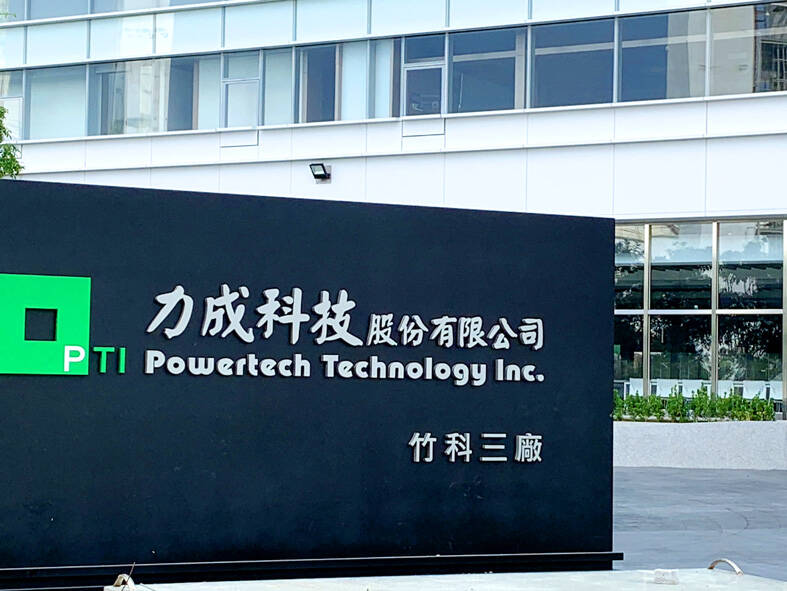Chip testing and packaging services provider Powertech Technology Inc (力成科技) yesterday said it expects revenue to rebound sequentially this quarter and next, driven by recovering demand for DRAM chips and chips used in artificial intelligence (AI) applications.
The company said the pickup in memorychip packaging and testing services would fuel growth, as customers are close to clearing their excess inventories.
In addition, the company is seeing strong demand this quarter from Micron Technology Inc, which outsources a majority of its DRAM chip packaging and testing work to Powertech, as the US firm focuses on producing high-bandwidth memory products for AI servers.

Photo: Grace Hung, Taipei Times
“We are benefiting from a long-term partnership with the company,” Powertech chief executive officer Boris Hsieh (謝永達) told investors yesterday. “Overall, we expect the second quarter to perform better than the first, and the third quarter to surpass the second.”
However, Hsieh cautioned that uncertainty surrounding US “reciprocal” tariffs poses a risk, as Washington’s tariff and trade policies could stoke inflation and weaken end-market demand.
The DRAM segment accounted for 21 percent of Powertech’s revenue in the March quarter, following the NAND flash memory segment at 24 percent and the logic chip segment at 47 percent.
Powertech also sees robust demand for logic chip packaging and testing services, driven by the rapid uptake of AI-enabled applications across sectors from PCs to cars, Hsieh said.
To meet rising demand, Greatek Electronics Inc (超豐), Powertech’s logic chip packaging and design service arm, has scrambled to expand its production capacity, Hsieh said.
Orders received by Greatek this month have surged to their highest level since the COVID-19 pandemic, as customers shift business to Greatek and other companies included on the US “whitelist,” he added.
“Rush orders are flooding in during the second quarter,” Hsieh said. “Due to uncertainty about the US’ semiconductor tariff policy, customers have proactively boosted their inventory of finished products to prepare for future policy changes.”
However, the momentum could ebb after June, as customers might become more cautious about building their inventories, he said.
The company expects AI-related revenue to increase this quarter, extending the growth momentum seen last quarter, when AI chip packaging and testing services accounted for 10 percent of total revenue, up from 8 percent in the previous quarter.
In addition, Powertech has made faster-than-expected progress in developing fan-out panel-level packaging (FOPLP) technology, achieving a better-than-anticipated yield rate, Hsieh said.
The company has outpaced industry peers, including Taiwan Semiconductor Manufacturing Co (台積電) and ASE Technology Holding Co (日月光投控), in advancing FOPLP development, he added.
Powertech yesterday reported its weakest quarterly net profit in 8 quarters, attributable to weak demand for packaging and testing services for DRAM and NAND chips.
The first quarter was the trough of the current downcycle, it said.
Net profit fell 18.1 percent to NT$1.58 billion (US$49 million), down from NT$1.93 billion in the previous quarter. Earnings per share (EPS) dropped to NT$1.58 from NT$2.04.
On an annual basis, net profit dropped 25.1 percent from NT$2.11 billion, or EPS of NT$2.32, as the company completed the divestment of its DRAM manufacturing facility in the Chinese city of Xian last year.

NEW IDENTITY: Known for its software, India has expanded into hardware, with its semiconductor industry growing from US$38bn in 2023 to US$45bn to US$50bn India on Saturday inaugurated its first semiconductor assembly and test facility, a milestone in the government’s push to reduce dependence on foreign chipmakers and stake a claim in a sector dominated by China. Indian Prime Minister Narendra Modi opened US firm Micron Technology Inc’s semiconductor assembly, test and packaging unit in his home state of Gujarat, hailing the “dawn of a new era” for India’s technology ambitions. “When young Indians look back in the future, they will see this decade as the turning point in our tech future,” Modi told the event, which was broadcast on his YouTube channel. The plant would convert

‘SEISMIC SHIFT’: The researcher forecast there would be about 1.1 billion mobile shipments this year, down from 1.26 billion the prior year and erasing years of gains The global smartphone market is expected to contract 12.9 percent this year due to the unprecedented memorychip shortage, marking “a crisis like no other,” researcher International Data Corp (IDC) said. The new forecast, a dramatic revision down from earlier estimates, gives the latest accounting of the ongoing memory crunch that is affecting every corner of the electronics industry. The demand for advanced memory to power artificial intelligence (AI) tasks has drained global supply until well into next year and jeopardizes the business model of many smartphone makers. IDC forecast about 1.1 billion mobile shipments this year, down from 1.26 billion the prior

People stand in a Pokemon store in Tokyo on Thursday. One of the world highest-grossing franchises is celebrated its 30th anniversary yesterday.

Zimbabwe’s ban on raw lithium exports is forcing Chinese miners to rethink their strategy, speeding up plans to process the metal locally instead of shipping it to China’s vast rechargeable battery industry. The country is Africa’s largest lithium producer and has one of the world’s largest reserves, according to the US Geological Survey (USGS). Zimbabwe already banned the export of lithium ore in 2022 and last year announced it would halt exports of lithium concentrates from January next year. However, on Wednesday it imposed the ban with immediate effect, leaving unclear what the lithium mining sector would do in the